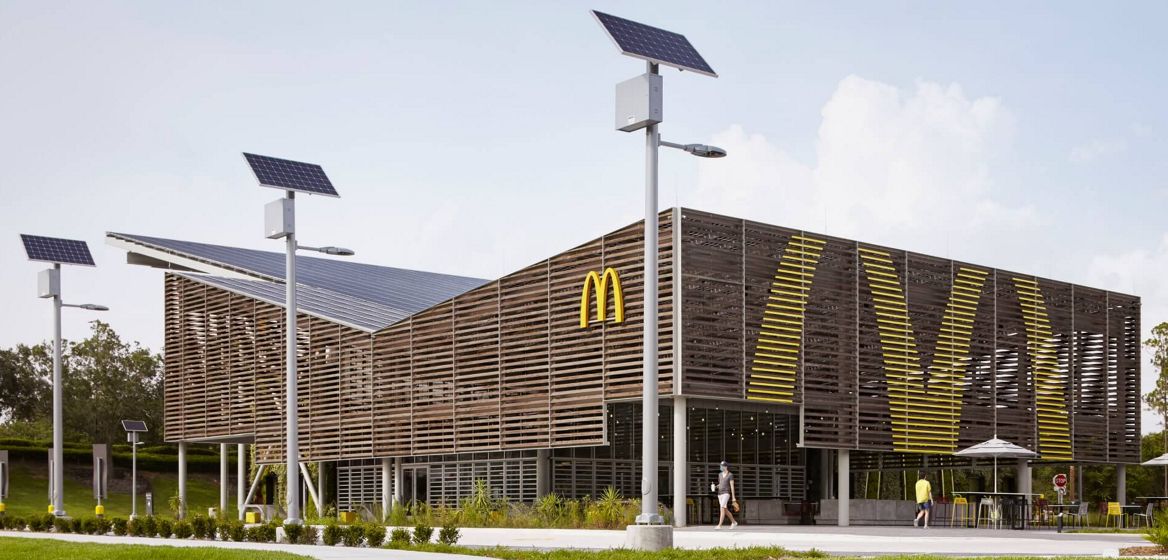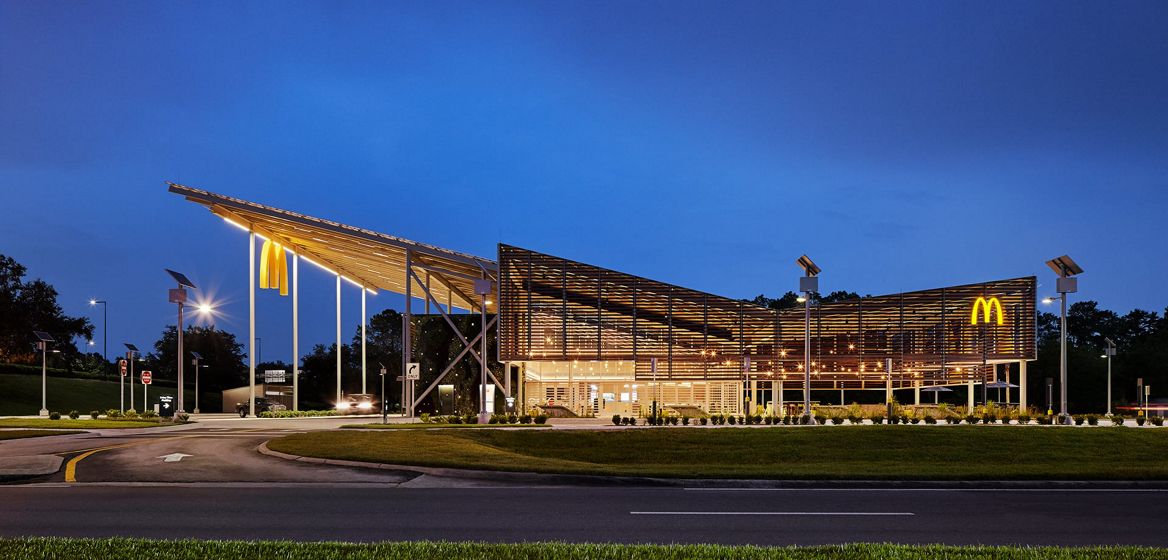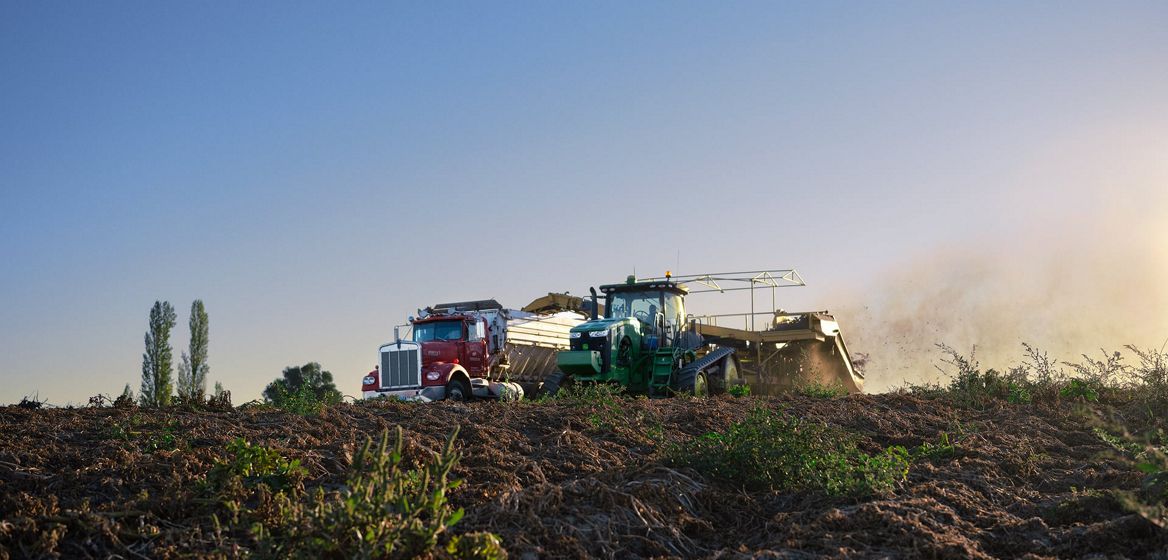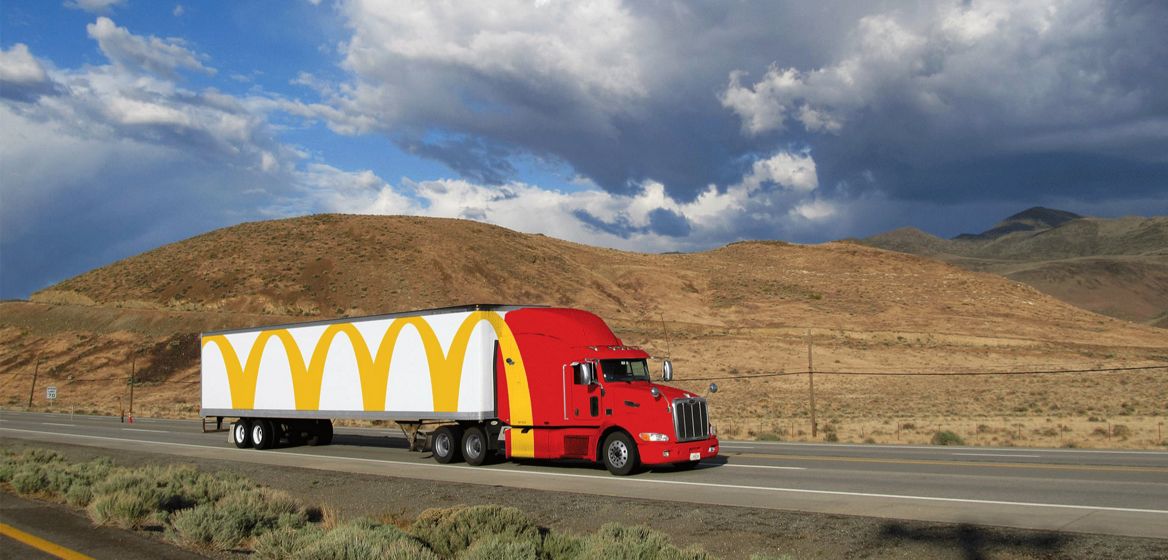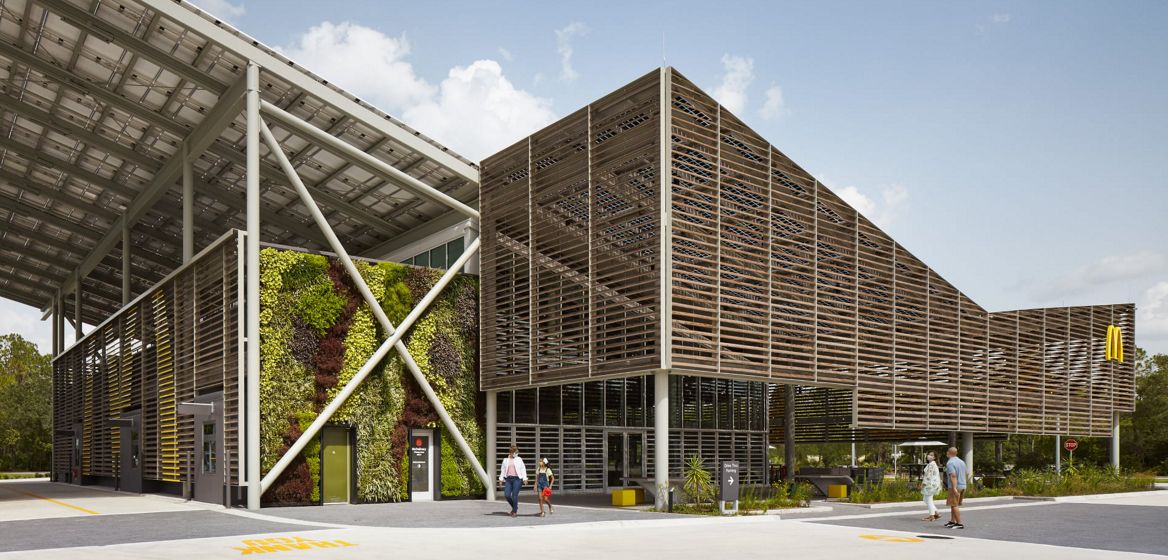Climate Action
We are taking action on climate and supporting food system transformation to help promote the future resiliency of our business.
We believe that reducing emissions and adapting to climate change is critical to helping improve the resilience of the McDonald’s System and our ability to serve our customers the food they love for generations to come. We work toward our climate action ambitions by focusing on reducing emissions in restaurant operations, engaging suppliers to reduce emissions in supply chains, strengthening our business resilience and using our voice to advocate for collective transformation.
See our latest Purpose & Impact Report on the Goal Performance & Reporting page for updates on our progress.
Our Strategy
Driving sustainable growth, while helping to positively impact our communities and the livelihoods of suppliers, farmers and producers, is fundamental to how we operate and the long-term resilience of our business. Natural disasters and extreme weather patterns pose increased risks to food supply chains and communities around the world, including those from which we operate and source. We are prioritizing actions in the most carbon-intensive aspects of Company- and Franchisee-owned and operated restaurants and our supply chain. We continue to implement our strategy through various actions, including:
- Restaurants and offices: We are driving a transition to more renewable energy while identifying opportunities to enhance energy efficiency by design in our restaurants and the equipment we use, such as by identifying lower-impact refrigerant solutions.
- Supply chain: We are engaging suppliers to set targets that support emissions reductions within their operations and supply chains. Together with our suppliers and other relevant stakeholders, we are accelerating and scaling farm projects to help reduce emissions, with a focus on regenerative agriculture, and conserving forests and natural ecosystems consistent with our Commitment on Forests and Natural Ecosystems (PDF – 126 KB). We also encourage our suppliers to reduce their facilities’ emissions and source renewable energy.
- Collaborating to drive and advocate for change: Beyond our System, we are using our scale to work with industry, governments, nongovernmental organizations (NGOs) and others to advocate for climate action initiatives.
On this page, you’ll find out more about our strategy and impact reduction measures across our business.
Our Net Zero Targets
In 2023, The SBTi validated our global 2050 net zero emissions reduction target and our adjusted 2030 global emissions targets, aligned with the latest guidance to help keep global temperature rises below 1.5°C.1
Our 2030 Emissions Target
By the end of 2030, from a 2018 base year, McDonald’s commits to reduce:
- Absolute Scope 1 and 2 GHG emissions by 50.4% from Company-owned and operated restaurants and offices.
- Absolute Scope 3 energy and industrial GHG emissions by 50.4% from Franchisee- and Company-owned and operated restaurants, and the facility, logistics and plastic packaging emissions in our supply chain.
- Absolute Scope 3 FLAG GHG emissions by 16% and to maintain no deforestation across its primary deforestation-linked commodities.
Achieving these ambitions will require continued and immediate action throughout our own business and across our full value chain – including our Franchisees and suppliers – with support and enabling conditions and policies from industry peers, NGOs and government at all levels. Among other efforts, we intend to continue focusing on:
- Driving renewable energy development through our portfolio of VPPAs and exploring other avenues to procure renewable energy to power our restaurants and offices.
- Scaling regenerative agriculture practices within our supply chain (see Responsible Sourcing).
- Contributing to deforestation-free supply chains for our primary commodities in highest-priority regions through our sourcing actions (see Nature, Forests & Water).
- Using our voice to engage on and advocate for climate-positive policies globally.
Recognizing the Evolving Landscape
We will continue to drive meaningful progress on our global target while recognizing that our emissions reduction plans and ambitions may be impacted by elements outside the Company’s direct control. This may include external policy and geopolitical changes, technological advancements, developments in global climate accounting standards and the actions of our independent Franchisees and suppliers.
Currently, we have aligned our target with the SBTi’s guidance for target-setting, and our data collection and analysis approach is informed by the Greenhouse Gas Protocol (GHGP), the primary global emissions accounting framework. We will continue to share our progress as regulations, and reporting and accounting frameworks, evolve. Any changes to third-party guidance or technologies that were utilized to inform our strategies and progress have the potential to impact our ability to meet our current targets. Given the long-term nature of our strategies, this could result in revision of our assumptions, calculations and targets, depending on how standards and measurement capabilities develop.
We also acknowledge that external climate accounting standards will need to continue evolving in a pragmatic way – especially for the attribution of renewable energy credits and nature-based emissions reduction solutions such as soil carbon sequestration and land use change – to enable us to meet our current targets.
Our climate ambitions will be balanced with overall Company performance ambitions, including financial growth and continued innovation in our menu offerings and sourcing. The Company’s pursuit of financial growth strategies, including the development of new restaurants and continued sales growth, could also result in an increase in near- or medium-term GHG emissions if we do not decarbonize our footprint at a rate greater than business growth. This balance of Companywide objectives and navigating the external environment will remain critical in enabling progress on our climate targets while also driving our business strategies forward.
Our Performance Data
See our Goal Performance & Reporting page for updates on our latest GHG emissions data.
How We Measure Our Climate Impact
We hold ourselves accountable by measuring emissions annually and working with experts to report our progress using the latest leading methodologies for data collection and analysis, notably the GHG Protocol.
We have an internal, enterprise-level climate tracking system that uses millions of data points to model emissions from our sourcing, restaurants and operations. The system is also a way to share actionable data and benchmarking insights with key internal audiences to inform strategy development. We follow tailored approaches to calculate emissions in various categories.
Our climate plans and targets are informed by internal and external data sets that are potentially incomplete and continue to evolve over time. This includes Company growth predictions and emissions footprint measurements for various operational activities and geographies. We will continue to evolve the systems we use through annual reviews of data quality and completeness, climate accounting methodology and the latest external scientific insights and benchmarking capabilities. Therefore, we expect that, going forward, our baseline and annual progress figures may adjust accordingly. See our latest Purpose & Impact Report for updates on our progress.
Collaborating to Drive Change
We know addressing climate change requires a collective effort across our global community. That is why we’re working with our suppliers, Franchisees, industry, governments, NGOs and others.
Climate-Related Pledges, Groups & Memberships
Collaborations help us contribute to climate action and advocate for positive climate policy. We know the realization of our climate ambitions will require significant action from the McDonald’s System and beyond. We are working with various stakeholders to help enable a shift in climate policy, knowledge and accounting, including:
- Clean Energy Buyers Association (CEBA): As a member of CEBA, we collaborate with other energy buyers, energy providers and service providers to navigate energy market complexities.
- Consumer Goods Forum (CGF) Forest Positive Coalition: A multi-company initiative to stop commodity-driven deforestation and address global climate change issues across the sector. Learn more on our Nature, Forests & Water page.
- Greenhouse Gas Protocol: Technical Working Group on Land-Based Emissions: Through this working group, we collaborated with GHG accounting specialists, NGOs and other companies to establish standards and guidance for use when measuring the impact of emissions from farming, forestry and other land-based activities.
- SBTi’s FLAG project consultative group: In 2022, we contributed to expert advice and direction for companies in land-intensive sections to ensure criteria for target-setting are clear and practical. This experience helped inform our own journey to update our SBTi-validated targets.
- U.S. Congress: We meet with Members of Congress and staff to discuss climate-related topics that are of importance to the Company.
- The World Business Council for Sustainable Development (WBCSD): We joined the WBCSD’s Agriculture and Food Pathway to protect climate and restore nature while supporting food and nutrition security for the world’s growing population.
- WWF's Climate Business Network: We joined the network to exchange ideas with peers on how to reduce emissions in line with our global climate targets.
Climate Action in Our Supply Chain
Together with our suppliers, we share a commitment to take action to address climate change.
Supplier-Supported Climate Action
Our ability to measure and achieve reductions in overall GHG emissions – particularly our Scope 3 emissions – depends significantly on the work and collaboration of our suppliers. We encourage our suppliers to commit to setting science-based targets. This expectation is communicated to suppliers, with support provided through our Global Sustainable Sourcing Guide.
Through our climate data and insights platform, we model the various impacts suppliers and sourcing categories have on our emissions. These insights allow us to target our work with suppliers on strategies that support our science-based targets and reduce our collective climate impact.
Nature-Based Climate Solutions
We believe in the power of sustainable agriculture practices to help increase biodiversity, enrich soils and improve climate resilience. At McDonald’s, we look to scale the adoption of regenerative agriculture principles by our suppliers to help build more resilient supply chains and drive action against our climate goals.
Read our approach to eliminating deforestation and addressing conversion on our Nature, Forests & Water page and our approach to regenerative agriculture and responsible farm management on our Responsible Sourcing page.
Managing Our Transport & Logistics Impact
We have a two-fold approach to working with our suppliers to achieve world-class logistics operations with the lowest feasible environmental footprint:
- Driving fewer miles and using less fuel through routing improvements, innovations like engineless cooling and air deflectors, and driver training.
- Increasing the use of alternative fuels with lower emissions compared to diesel, including renewable natural gas created from biowaste, biofuels, hydrogen, natural gas, propane and electricity. Where possible, we encourage suppliers to use biofuels that are generated from by-products rather than crops grown for food.
Climate Action Across Our Restaurants & Offices
Restaurant energy use is a key focus area for accelerating progress against our 2030 targets. With restaurants in over 100 markets globally, approximately 95% of which are franchised, we are working with our Franchisees on innovative solutions for creating and managing increasingly efficient locations. This includes investing in areas such as LED lighting, energy management systems and energy-efficient kitchen equipment. Across the globe, our markets are in various phases of strategy development and implementation.
Adding Renewable Energy to the Grid
We believe that one of the most effective and timely actions we can take to reduce electricity-related emissions is purchasing renewable energy (i.e., wind- or solar-generated) to cover restaurant energy needs. We are increasingly looking for solutions that will enable us to power more of our sites with renewable energy sources while also taking steps to help increase awareness about and adoption of renewable energy throughout the System. We collaborate with our markets, Franchisees and trade associations to understand the complex local and global landscape, identify opportunities to support renewable energy growth and evaluate opportunities to advocate for policies that help accelerate progress in this space.
Since 2019, McDonald’s has signed multiple large-scale renewable energy VPPAs that will help add new renewable energy from solar and wind technologies to the U.S. grid. We have invested in such projects that are operational in Texas, Illinois, Oklahoma and Louisiana.
As renewable energy use is a key driver of our overall climate strategy, we continue to work across both Company-owned and operated and franchised restaurants globally to understand the energy landscape on a local level and where there are opportunities to drive maximum impact across our System. Our ability to meet our SBTi-validated targets may be impacted if third-party accounting methodologies do not enable or recognize McDonald’s procurement of renewable energy to help reduce Franchisee restaurant emissions. While there is uncertainty regarding how third-party accounting methodologies may evolve, our corporate VPPA program is focused on advancing wide-reaching impact and has been able to support projects that help drive renewable energy additionality.
California Voluntary Carbon Market Disclosures Act
McDonald’s Corporation makes the following information available pursuant to the California Voluntary Carbon Market Disclosures Act: McDonald’s California Voluntary Carbon Market Disclosures Act (VCMDA) Disclosure Statement (PDF – 144 KB).
Footnotes
1 McDonald’s SBTi-validated target in full:
- McDonald’s Corporation commits to reduce absolute Scope 1 and 2 GHG emissions 50.4% by 2030 from a 2018 base year.
- McDonald’s Corporation also commits to reduce absolute Scope 3 energy and industrial GHG emissions from purchased goods and services, fuel- and energy-related activities, upstream transportation and distribution, waste generated in operations, end-of-life treatment of sold products, and franchises 50.4% within the same timeframe.
- McDonald’s Corporation commits to reduce absolute Scope 3 FLAG GHG emissions 16% by 2030 from a 2018 base year. McDonald’s Corporation also commits to maintain no deforestation across its primary deforestation-linked commodities.

